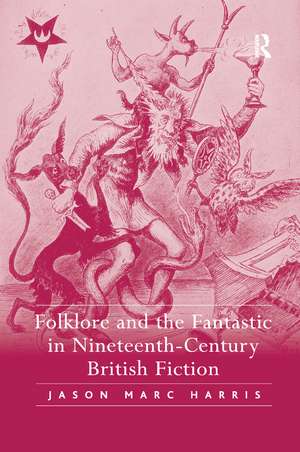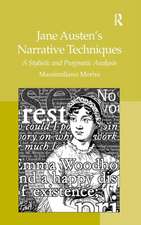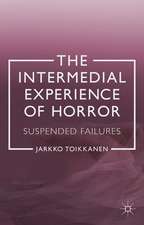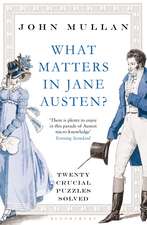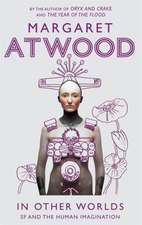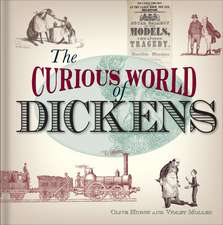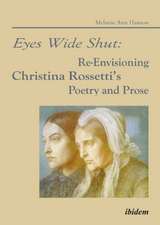Folklore and the Fantastic in Nineteenth-Century British Fiction
Autor Jason Marc Harrisen Limba Engleză Paperback – 19 oct 2016
| Toate formatele și edițiile | Preț | Express |
|---|---|---|
| Paperback (1) | 324.16 lei 6-8 săpt. | |
| Taylor & Francis – 19 oct 2016 | 324.16 lei 6-8 săpt. | |
| Hardback (1) | 820.71 lei 6-8 săpt. | |
| Taylor & Francis – 28 ian 2008 | 820.71 lei 6-8 săpt. |
Preț: 324.16 lei
Preț vechi: 432.00 lei
-25% Nou
Puncte Express: 486
Preț estimativ în valută:
62.05€ • 67.42$ • 52.15£
62.05€ • 67.42$ • 52.15£
Carte tipărită la comandă
Livrare economică 21 aprilie-05 mai
Preluare comenzi: 021 569.72.76
Specificații
ISBN-13: 9781138259546
ISBN-10: 1138259543
Pagini: 248
Dimensiuni: 156 x 234 mm
Greutate: 0.45 kg
Ediția:1
Editura: Taylor & Francis
Colecția Routledge
Locul publicării:Oxford, United Kingdom
ISBN-10: 1138259543
Pagini: 248
Dimensiuni: 156 x 234 mm
Greutate: 0.45 kg
Ediția:1
Editura: Taylor & Francis
Colecția Routledge
Locul publicării:Oxford, United Kingdom
Notă biografică
Dr Jason Marc Harris is an assistant professor in the Dept. of Humanities and Communications at the Florida Institute of Technology. He is the coauthor (with Birke Duncan) of a folklore study, The Troll Tale and Other Scary Stories (2001). Besides writing various articles about the interaction between folklore and literature, he recently provided an introduction to Robert Louis Stevenson's The Master of Ballantrae for the Barnes and Noble Library of Essential Reading Series (2006).
Recenzii
Shortlisted for the Mythopoeic Scholarship Award in Myth and Fantasy Studies 2009
’...helpful for those seeking an alternative methodology for exploring children's literature.’
International Research in Children's Literature
’... a welcome addition to current discussions and research about the hybridity of the literary fantastic and its intersections with folk narratives of the supernatural and fairy tales.’
Journal of Folklore Research
’... exemplifies the merits of interdisciplinary research. Showing a thorough understanding of both literary and folkloric scholarship, Harris does justice to the complex relationship of folklore, literature, and society in nineteenth-century Britain, while providing important insights into the writers under discussion and supporting his thesis that the literary fantastic (in nineteenth-century Britain, at least) rises out of and expresses the interplay between folk metaphysics and Enlightenment rationality. ... His book is highly recommended to anyone interested in folklore and literature, or in the history and ideology of fantasy.’
Journal of the Fantastic in the Arts
’No literary critic or cultural historian has approached the topic of folklore in literature with as thorough grounding in both the history and the method of folklore studies. The result is a rich, engrossing study of material that helps us to see the literary, political, and cultural significance of both works that have been much studied - the Victorian ghost story, Peter Pan, the work of Robert Louis Stevenson - and works that will be new to many readers - from Victorian literary fairy tales to William Carleton and William Sharpe, of the Celtic Renaissance.’
Journal of British Studies
’... there is in-depth analysis of at least seven more or less well-known British authors (namely George MacDonald, James Barrie, James Hogg, Sheridan Le Fanu, Robert Louis Stevenson, William Carleton and William Sharpe)."
’...helpful for those seeking an alternative methodology for exploring children's literature.’
International Research in Children's Literature
’... a welcome addition to current discussions and research about the hybridity of the literary fantastic and its intersections with folk narratives of the supernatural and fairy tales.’
Journal of Folklore Research
’... exemplifies the merits of interdisciplinary research. Showing a thorough understanding of both literary and folkloric scholarship, Harris does justice to the complex relationship of folklore, literature, and society in nineteenth-century Britain, while providing important insights into the writers under discussion and supporting his thesis that the literary fantastic (in nineteenth-century Britain, at least) rises out of and expresses the interplay between folk metaphysics and Enlightenment rationality. ... His book is highly recommended to anyone interested in folklore and literature, or in the history and ideology of fantasy.’
Journal of the Fantastic in the Arts
’No literary critic or cultural historian has approached the topic of folklore in literature with as thorough grounding in both the history and the method of folklore studies. The result is a rich, engrossing study of material that helps us to see the literary, political, and cultural significance of both works that have been much studied - the Victorian ghost story, Peter Pan, the work of Robert Louis Stevenson - and works that will be new to many readers - from Victorian literary fairy tales to William Carleton and William Sharpe, of the Celtic Renaissance.’
Journal of British Studies
’... there is in-depth analysis of at least seven more or less well-known British authors (namely George MacDonald, James Barrie, James Hogg, Sheridan Le Fanu, Robert Louis Stevenson, William Carleton and William Sharpe)."
Cuprins
Preface; Acknowledgments; Chapter 1 An Introduction to Folklore and the Fantastic in Nineteenth-Century British Literature; Chapter 2 Victorian Literary Fairy Tales: Their Folklore and Function; Chapter 3 Victorian Fairy-Tale Fantasies: MacDonald’s Fairyland and Barrie’s Neverland; Chapter 4 MacDonald’s; Lilith; and; Phantastes; : In Pursuit of the Soul in Fairyland; Chapter 5 James Hogg’s Use of Legend: Folk Metaphysics and Narrative Authority; Chapter 6 Ghosts, “Grand Ladies,” “The Gentry,” and “Good Neighbors”: Folkloric Representations of the Spirit World’s Intersection with Class and Racial Tensions in Le Fanu; Chapter 7 Robert Louis Stevenson: Folklore and Imperialism; Chapter 8 William Carleton and William Sharp: The Celtic Renaissance and Fantastic Folklore; Chapter 9 Conclusion: Second Sight;
Descriere
Arguing that the tensions between folk metaphysics and Enlightenment values produce the literary fantastic, Jason Marc Harris demonstrates that a negotiation with folklore was central to the canon of British literature. He uncovers the ideological agendas articulated using folkloric elements in works by James Barrie, William Carleton, James Hogg, Sheridan Le Fanu, George MacDonald and Robert Louis Stevenson, among others, and reveals the rhetorical strategies for applying superstition in both folkloric and literary contexts of the supernatural.
